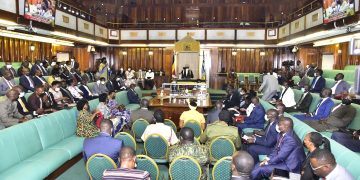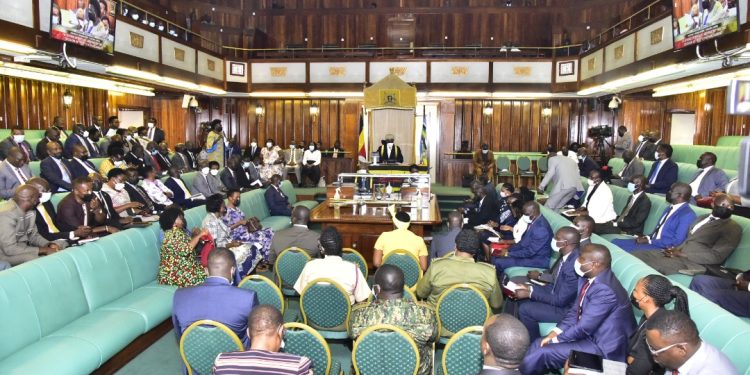Members of Parliament have urged telecommunication service providers to adopt more friendly data and voice bundles.
This, according to the MPs, is intended to ensure that consumers of communication services get quality, reliable and affordable communication services to widen Information Communication Technology (ICT) penetration as a key driver of economic growth.
While chairing the House on Wednesday, 13 July 2022, Deputy Speaker Thomas Tayebwa tasked the Uganda Communication Commission (UCC), the national regulatory body of the communications sector to engage these companies to exclusively provide unlimited data and voice call bundles that do not expire.
“This issue of expiry of data and voice bundles needs to be addressed. How do you tell me that bundles have expired? Technology has no expiry date. In many countries, one is only required to reactivate the bundle; it’s like money on your account where the bank tells you that your account has become dormant, it is then reactivated and you can access your money,” Tayebwa said.
He also urged UCC to direct telecom service providers to remove interconnection fees that have created unhealthy monopolistic tendencies, making it costly for subscribers to make calls across other networks.
The discussion was premised on the report of the Committee on ICT and National Guidance on the petition of Kawempe Division South constituents on unsatisfactory and unfair services delivery by telecommunication and television service providers in the country.
According to the report presented by the committee chairperson, Moses Magogo, Ugandans continue to pay heavily in their bid to access telecommunication services characterised by dropped calls, exorbitant rates on data bundles, unrealistic consumption patterns and expiry of internet bundles among others.
The committee in their report recommended that the regulatory body enhances sensitisation of the public on the various data and voice bundles for use and encourage telecom service providers to provide friendlier bundle subscriptions.
“UCC should also enhance engagements with the telecommunication operators to develop and provide a broad range of bundles that will encourage customers to access internet and call subscriptions,” Magogo said.
Recently, telecom operators have come up with a range of pricing packages which give consumers an opportunity to choose ranging from time-bound bundles or unlimited bundles that do not expire like the MTN Freedom Bundles, Airtel’s Chillax Bundles and Smile Telecom’s Forever Bundles.
According to Napak district Woman MP, Hon. Faith Nakut, lack of affordable internet accessibility has hampered the implementation of government’s new curriculum in secondary schools.
“Secondary schools are implementing a curriculum that requires students to do research, but access to internet data is still limited. How are we managing these children? The Ministry of ICT should negotiate for lower internet rates for our children in schools especially those in rural schools,” Nakut said.
Kira Municipality MP, Ibrahim Ssemujju said it is high time government stopped considering access to internet as a luxury, but rather a right.
“Agro-processing, ICT and tourism have been identified by government as key priorities, but ICT sector has been abandoned to private players, that is how we are able to nearly sell all equipment that UTL had to private players,” Ssemujju said.
Hon. Joyce Acan (Persons with Disabilities) raised concerns of cyber security where unscrupulous people are swapping customer’s sim cards and using them for fraudulent and heinous acts.
ICT committee chairperson, Hon. Moses Magogo says Ugandans continue to pay heavily to access telecommunication services
For Kampala Central Legislator, Muhammad Nsereko, this fraud in mobile money sector is due to gaps in the cyber security space.
“The cloning of sim cards is done technically from the devices. Each device has the International Mobile Equipment Identification number (IMEI) and if someone gets into your IMEI and into your Integrated Circuit Card ID then they will clone your sim card without having it; they become men in the middle and can intercept all your phone calls,” Nsereko said.
According to the committee report, poor quality of telecom services is as a result of internal and external factors such as caller movements from over served to undeserved areas and unfavourable socio-economic factors.
The report also attributed the poor quality of services in the country to vandalism and theft of communication infrastructure equipment, unreliable power supply especially in rural areas where the country’s largest electricity distributor’s (umeme) supply is erratic.
For television service providers, the committee recommended that a billing policy is issued to regulate the payment structure in order to ensure that pay TV subscribers only pay for the time and content they are viewing.









